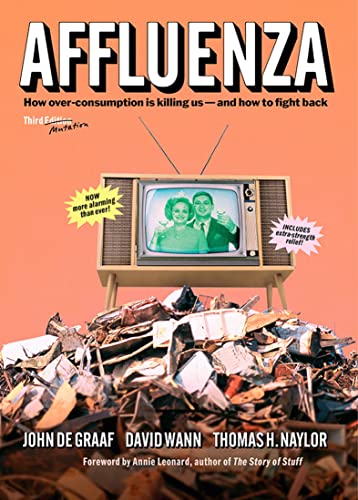Affluenza - the Quick 30-Second Overview
Affluenza explores the negative consequences of the pursuit of material wealth and consumerism on individual well-being and society as a whole. The term "affluenza" refers to a set of values and beliefs that prioritize material success and wealth accumulation over other aspects of life, such as personal relationships, community engagement, and mental and physical health. The authors argue that affluenza has become a pervasive cultural phenomenon in Western societies, fueling anxiety, depression, and social isolation, and contributing to environmental degradation and economic inequality.
The book presents a range of evidence, including psychological research and sociological data, to support the argument that affluenza is a major problem that requires urgent attention. There are some suggestions for how individuals and policymakers can address the negative impacts of affluenza, such as promoting alternative measures of success and well-being, reducing material consumption, and investing in public goods like education, healthcare, and environmental protection. Overall, Affluenza provides a thought-provoking analysis of the costs and consequences of consumerism and highlights the need for a more sustainable and fulfilling approach to life.
"Affluenza The All-Consuming Epidemic", is a book written by authors John de Graaf, David Wann, and Thomas H. Naylor.
According to Merriam Websters Dictionary Afflunzer is an "extreme materialism and consumerism associated with the pursuit of wealth and success and resulting in a life of chronic dissatisfaction, debt, overwork, stress, and impaired relationships"
Affluenza is particularly rampant in the United States, where we place a high priority on financial success and material possessions.
—David Hawkins
The book explores the impact of consumerism on society and argues that it has created a widespread and damaging social condition called "affluenza."The authors define affluenza as a "painful, contagious, socially transmitted condition of overload, debt, anxiety, and waste resulting from the dogged pursuit of more." They argue that this condition is caused by a combination of factors, including the constant bombardment of advertising and media messages, the pressure to keep up with the Joneses, and a culture that places a high value on material possessions.
The book is divided into three sections. In the first section, the authors provide an overview of the history of consumerism and its impact on society. They argue that the rise of consumerism in the 20th century has led to a culture that values material possessions over other aspects of life, such as community and personal relationships. In the second section, the authors explore the symptoms of affluenza and how they manifest in individuals and society as a whole.
They discuss how affluenza can lead to debt, stress, anxiety, and a lack of fulfilment, and how it can contribute to social problems such as inequality, environmental degradation, and overconsumption. In the final section, the authors offer solutions to the problem of affluenza. They argue that we need to shift our priorities away from consumerism and towards a more sustainable and fulfilling way of life. They suggest that we need to focus on building strong communities, developing meaningful relationships, and finding joy in non-material pursuits such as art, music, and nature.
Overall, "Affluenza" is a thought-provoking book that raises important questions about the impact of consumerism on society. It offers a compelling argument for why we need to rethink our values and priorities if we want to create a more just and sustainable world.
Top 5 Key Insights from the book "Affleunza"
- Material possessions do not bring lasting happiness
- Consumerism is a cycle that we can break free from
- Personal growth and development are essential for happiness
- Intentionality is key
- Happiness is not a destination, but a journey



